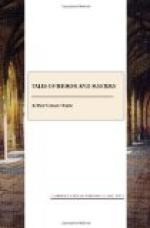“Undoubtedly. But two signatures are necessary.”
“You forget that I am myself a holder of a medical degree. I have the papers on a side-table here, so if you will be good enough to sign them now, we can have the patient removed in the morning.”
So that was my visit to Sir Thomas Rossiter, the famous beetle-hunter, and that was also my first step upon the ladder of success, for Lady Rossiter and Lord Linchmere have proved to be staunch friends, and they have never forgotten my association with them in the time of their need. Sir Thomas is out and said to be cured, but I still think that if I spent another night at Delamere Court, I should be inclined to lock my door upon the inside.
The Man with the Watches
There are many who will still bear in mind the singular circumstances which, under the heading of the Rugby Mystery, filled many columns of the daily Press in the spring of the year 1892. Coming as it did at a period of exceptional dullness, it attracted perhaps rather more attention than it deserved, but it offered to the public that mixture of the whimsical and the tragic which is most stimulating to the popular imagination. Interest drooped, however, when, after weeks of fruitless investigation, it was found that no final explanation of the facts was forthcoming, and the tragedy seemed from that time to the present to have finally taken its place in the dark catalogue of inexplicable and unexpiated crimes. A recent communication (the authenticity of which appears to be above question) has, however, thrown some new and clear light upon the matter. Before laying it before the public it would be as well, perhaps, that I should refresh their memories as to the singular facts upon which this commentary is founded. These facts were briefly as follows:
At five o’clock on the evening of the 18th of March in the year already mentioned a train left Euston Station for Manchester. It was a rainy, squally day, which grew wilder as it progressed, so it was by no means the weather in which anyone would travel who was not driven to do so by necessity. The train, however, is a favourite one among Manchester business men who are returning from town, for it does the journey in four hours and twenty minutes, with only three stoppages upon the way. In spite of the inclement evening it was, therefore, fairly well filled upon the occasion of which I speak. The guard of the train was a tried servant of the company—a man who had worked for twenty-two years without a blemish or complaint. His name was John Palmer.




